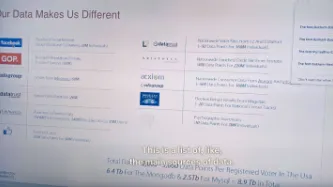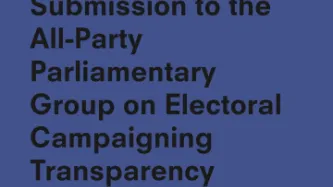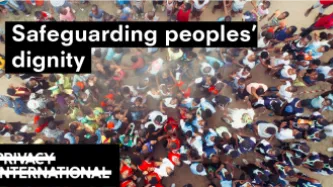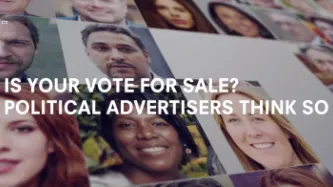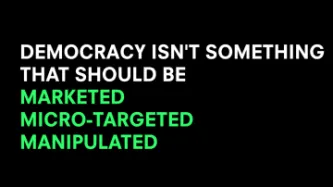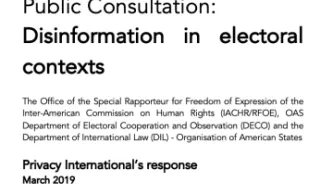Advanced Search
Content Type: Examples
After an 18-month investigation involving interviews with 160 life insurance companies, in January 2019 New York Financial Services, the state's top financial regulator, announced it would allow life insurers to use data from social media and other non-traditional sources to set premium rates for its customers. Insurers will be required to demonstrate that their use of the information doesn't unfairly discriminate against specific customers. New York is the first state to issue specific…
Content Type: Examples
In December 2018, Facebook provided an update on the civil rights audit it asked civil rights leader Laura Murphy to undertake in May. Based on advice Murphy culled from 90 civil society organisations, Facebook said it had expanded its policy prohibiting voter suppression, updated its policy to ban misrepresentation about how to vote, begun sending information about voting to third-party fact checkers for review, and was ramping up efforts to encourage voter registration and engagement.
https…
Content Type: Examples
In February 2019, the World Food Programme, a United Nations aid agency, announced a five-year, $45 million partnership with the data analytics company Palantir. WFP, the world's largest humanitarian organisation focusing on hunger and food security, hoped that Palantir, better known for partnering with police and surveillance agencies, could help analyse large amounts of data to create new insights from the data WFP collects from the 90 million people in 80 countries to whom it distributes 3…
Content Type: Advocacy
Dear Chair and Committee colleagues,
Privacy International is an international NGO, based in London, which works with partners around the world to challenge state and corporate surveillance and data exploitation. As part of our work, we have a dedicated programme “Defending Democracy and Dissent” where we advocate for limits on data exploitation throughout the electoral cycle.
We have been closely following the important work of the Committee. Prompted by the additional evidence provided…
Content Type: Advocacy
On 26 July 2019, Privacy International sent the attached written evidence submission to the UK All Parliamentary Party Group on Electoral Campaigning Transparency.
In the UK, All-Party Groups (APPGs) are informal groups of Members of both the House of Commons and House of Lords with a common interest in particular issues.
Content Type: Advocacy
As an organisation that has been fighting to protect people's data and privacy since the 1990s, we were left speechless by your redemption of Cambridge Analytica’s former staff ("What Cambridge Analytica’s ex-staff can teach us about data defence”, Gillan Tett, July 24, 2019).
How can we prevent a repeat of the Cambridge Analytica scandal?, Tett asks, yet fails to even mention the core solution that is universally proposed by privacy professionals around the world: comprehensive…
Content Type: News & Analysis
This blogpost is a preview of the full 'Our Data Future' story, produced by Valentina Pavel, PI Mozilla-Ford Fellow, 2018-2019.
2030.
Four worlds.
One choice. Which one is yours?
All aboard! Time to step into the imaginarium. Explore four speculative future scenarios, examining how different ways of governing data create vastly different worlds. How is our digital environment going to look like in ten years' time? What’s going to be our relationship with data?
Each of us has a role in…
Content Type: Examples
Bahrain has warned its citizens and residents could face legal action simply for following social media accounts it deems anti-government, which raises concerns about the ability of Bahraini citizens and residents to exercise their fundamental rights and freedoms. In May 2019, a state terrorism law was expanded to criminalise anyone “promoting, glorifying, justifying, approving or supporting acts which constitute terrorist activities,” whether within or outside Bahrain. The government’s…
Content Type: Long Read
Whilst innovation in technology and data processing have provided individuals and communities with new opportunities to exercise their fundamental rights and freedoms, this has not come without risks, and these opportunities have not been enjoyed by all equally and freely.
Our relationships and interactions with governments and industry have become increasingly dependent on us providing more and more data and information about ourselves. And, it’s not only the information we provide knowingly…
Content Type: News & Analysis
In July 2019, the UK House of Commons' Science and Technology Committee published a report on Digital Government. Lying not so subtlely amongst it's recommendations is this: "The Government should facilitate a national debate on single unique identifiers for citizens to use for accessing public services along with the right of the citizen to know exactly what the Government is doing with their data."
It's been pointed out that this is basically some of the worst features of an ID card…
Content Type: Long Read
The UK public, regulators, and parliamentarians have all expressed concern about the wide use of third-party data by all political parties in the UK and its impact on privacy and democracy. In the week the remaining six candidates to be the UK’s next Prime Minister are reduced to two, Privacy International takes a look at their privacy policies to illustrate how such policies can be used to identify the use of third-party data by political candidates from all political parties.
The…
Content Type: Video
Watch our video primer (1m54s) on how political advertisers use highly detailed data about you to target political adverts at you.
Read about some simple steps you can take to minimise the amount of political ads you see online and questions you can be asking of those that profit from your data.
Content Type: Long Read
OPTION 1 - LIMIT TARGETED ADVERTISING
A simple step you can take is turning on strong (as possible) privacy settings on the social media platforms you use. Social media platforms play a key role in targeting ads at you – and they facilitate the use of your data in ways that you probably wouldn’t like. We've made guides to show you how to minimise the targeted ads you see on social media. These steps can help make advertising less targeted, meaning that an advertiser, in theory, will knows less…
Content Type: Key Resources
Ukraine held Presidential elections in April 2019. In the run up to the election, there was much debate on the role of Facebook.
Content Type: Key Resources
In the lead up to the 2017 German federal elections, there was much debate about the benefits and dangers of data analytics for political purposes. There were some controversies concerning the use of data and the lack of information provided by political parties also raised concerns.
Content Type: Key Resources
In the run up to the French presidential election of 2017, political parties increasingly used data-driven targeting techniques and companies to manage their campaigns. Here are some examples.
Content Type: Key Resources
Political campaigns, debate and engagement has become increasingly digitalised in Italy. Here are some examples of concerns this has raised.
Content Type: Examples
In February 2019, an anonymous tip-off to Computer Sweden revealed that a database containing recordings of 170,000 hours of calls made to the Vårdguiden 1177 non-emergency healthcare advice line was left without encryption or password protection on an open web server provided by Voice Integrate Nordic AB. After the breach was discovered, MedHelp, which runs the 1177 service, shut the server down and found that 55 call files had been illegally downloaded from seven different IP addresses. Nine…
Content Type: Examples
Facebook has taken down 65 accounts, 161 pages, dozens of groups and four Instagram accounts, which were ran by Archimedes Group, an Israeli political consulting and lobbying firm that aimed at disrupting elections in various countries.
Archimedes was mostly active in Sub-Saharan Africa but also some part of Southeast Asia and Latin America. According to Facebook, the accounts taken down were attempting to influence people in Nigeria, Senegal, Togo, Angola, Niger and Tunisia. But the most…
Content Type: Examples
In Ireland benefits claimants are expected to register for a Public Services Card (PSC) in order to access benefits. PSC users are expected to have their photographs taken in department offices, which is then digitally captured along with their signature. While this card was originally created to prevent benefits fraud – by insuring someone could not register twice to claim benefits – it is increasingly being used as a de facto form of ID and citizens have been apply for PSC even when they do…
Content Type: Examples
Cases of people being denied healthcare as they fail to provide an Aadhaar number have already started emerging. A 28-year old domestic worker, for instance, had to be hospitalised for a blood transfusion after she had an abortion with an unqualified local physician. She had been denied an abortion, to which she was legally entitled, from a reputable government hospital, as she did not have an Aadhaar card. Following this case, 52 public health organisations and individuals issued a statement…
Content Type: Examples
While not currently mandatory to access healthcare services, Aadhaar is however increasingly used in the health sector as well. In 2018, the health ministry had to issue a statement to clarify that Aadhaar was “desirable” but not a must to access a 5 rupee insurance cover for hospitalisation under the Ayushman Bharat scheme.
https://www.hindustantimes.com/india-news/aadhaar-desirable-not-must-for-rs-5-lakh-healthcare-scheme-says-centre/story-mvQwqSKzDFYE0rhxqLFbLO.html
Author: Rhythma Kaul…
Content Type: Examples
In India, one of the reasons the Aadhaar ID system has been increasingly widely used is that it is mandatory for much India’s benefits system. Government subsidies are now processed through under the Direct Benefit Transfer scheme, which requires citizens to have a bank account and to insure that their Aadhaar number is linked to their bank account so they can receive subsidies.
https://www.paisabazaar.com/aadhar-card/want-to-avail-government-subsidies-provide-aadhaar-and-get-it-easily/…
Content Type: Long Read
Image Source: "Voting Key" by CreditDebitPro is licensed under CC BY 2.0
Democratic society is under threat from a range of players exploiting our data in ways which are often hidden and unaccountable. These actors are manifold: traditional political parties (from the whole political spectrum), organisations or individuals pushing particular political agendas, foreign actors aiming at interfering with national democratic processes, and the industries that provide products that …
Content Type: Examples
The New York Times picked 16 categories (like registered Democrats or people trying to lose weight) and targeted ads at people in them. They used the ads to reveal the invisible information itself, noting that it is a "story of how our information is used not just to target us but to manipulate others for economic and political ends — invisibly, and in ways that are difficult to scrutinize or even question."
The article illustrates that even though data providers don’t…
Content Type: News & Analysis
The first half of 2018 saw two major privacy moments: in March, the Facebook/ Cambridge Analytica scandal broke, followed in May by the EU General Data Protection Regulation ("GDPR") taking effect. The Cambridge Analytica scandal, as it has become known, grabbed the attention and outrage of the media, the public, parliamentarians and regulators around the world - demonstrating that yes, people do care about violations of their privacy and abuse of power. This scandal has been one of…
Content Type: Advocacy
Consultation Submission
In March 2019, Privacy International submitted a response to a consultation on Disinformation in Electoral Contexts, led by the Office of the Special Rapporteur for Freedom of Expression of the Inter-American Commission on Human Rights together with the Department of Electoral Cooperation and Observation (DECO) and the Department of International Law (DIL) of the Organisation of American States (OAS).
In our submission we highlighted the importance of minmising data…
Content Type: Examples
The Five Star Movement, a populist party, which is currently in power along with the League in Italy initially grew out of Il Blog delle Stelle (formerly Beppe Grillo’s blog). The Five Star Movement was founded by comedian Beppe Grillo, along with Gianroberto Casaleggio, a web strategist in 2009. As well as the blog and The Five Star Movement’s heavy use of social media, it consults its supporters on candidates, policies and partnerships via a software system/ internet platform…
Content Type: Advocacy
In December 2018, PI responded to the UK Information Commissioner's (ICO) Call for Views on a Code of Practice for the use of personal information in political campaigns.
The consultation followed on from the ICO's policy report Democracy Disrupted?, published in July 2018, which recommended that the Government should legislate at the earliest opportunity to introduce a statutory Code of Practice under the Data Protection Act 2018 for the use of personal information in campaigns.…
